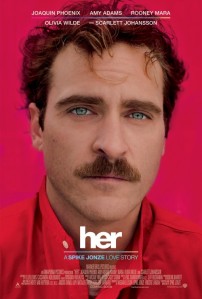“Bittersweet” is the best word to describe Her. Spike Jonze has taken our bad habits with technology and projected them to frame an original love story with messages of poignancy. It’s a personal film about an impersonal society.
The characters on-screen are closed off to everyone around them. Among them is writer Theodore Twombly (played by Joaquin Phoenix who is a spitting image of Napoleon Dynamite’s “womanizing” brother Kip). People are enjoyably and passively soaked into their own world via their devices, and don’t show any attachment – or interest – to the outside world.
As audiences acknowledge that Jonze’s vision of the future isn’t too far off from how we live now, we also fathom how secluded we’ve become because of how modern technology provides everything we need – including social activity.
It’s not just people who are shutting themselves out. Virtually every location in Her is concealed. Walkways are cavernous, buildings tower together to make a domed environment, and Twombly’s work and living space closes him off with limited interactivity. It’s not until he begins talking with his new personalized operating system (voiced by Scarlett Johansson playing the role of “Samantha”) that he begins breathing in the outside.
Jonze doesn’t show us our antisocial dirty laundry in a cynical way that scolds us for being shallow. In fact, the most impressive quality about Her is that it doesn’t mock or speak down to its audience. The filmmaker recognizes and observes our society’s current state, and accepts it. Her is simply a “head’s up” to one of the paths our lives could take if we continue ignoring.
Twombly, who’s gradually trying to muster the strength to sign off on his divorce papers, opens up to Samantha – a relationship buds. Since his OS is the only entity who can see into his documented life through his computer, Samantha is the only one who “gets” Theodore.
Her ways aren’t used to manipulate our lead into a gullible twit. Her inquisitive talks involve Theodore in a way that only his ex-wife could.
As Her flies along, Samantha and Theodore’s relationship blooms. They both admit that their involvements with each other are introducing them to new things. Especially Samantha, who is quickly evolving as she writes her own work and experiences Theodore’s sheepish attentiveness.
The connection between Phoenix and Johansson is strong and constantly watchable. That says a lot since one half of this duo is never seen on screen. Johansson does a terrific job at developing her audible performance, but Phoenix is sensational as an apprehensive one-man show.
Jonze, who also wrote the script, gets inside the head of someone who is sheltered and successfully establishes them over time in an authentic manner. His screenplay says beautiful statements about the ups and downs of love, growing up and growing apart, as well as having an observant eye for gawky sweetness without hitting any easy targets.
The competency in the writing continues after the exchanges between Theodore and his OS. Conversations between Theodore and his friend Amy (played by Amy Adams) are very dear and tender. Amy, who is also having a tough time herself figuring out the game of “love”, finds her talks with Theodore to be cathartic. The friendship between these characters is well drawn with real feelings of aggravation and lightheartedness.
If I have a main criticism towards Jonze’s script, it’s regarding the brewing of a dicey “fourth act”. Around the 90-minute mark, Jonze approaches a possible wrap-up that feels like a natural close to this story. However, he drives past the exit.
The remainder of Her is constructed well and continues to hold our attention, but there are a couple of moments where it feels as if Jonze is thinking on-the-fly and trying to cover up his missed opportunity. There were instances where I thought, “where exactly is this going?” only to be surprised to see the final outcome offer movie goers a touchingly humanistic conclusion to this delicate love story. As an afterthought, I suppose I kind of liked that feeling of not knowing where Her was leading me.
Her is bound to sink into our subconscious soon after watching. It goes to show that a filmmaker doesn’t have to put up a fuss to establish an opinion on modern day romance and why personable connections are important. They also don’t have to make a stink about materializing irony and poking at known introverted faults. Approaching the topics with elegance and civility earns Jonze splendid scenes of emotion and humour.
Spike Jonze, who has shown in early music videos to be an untamed visionary, has grown up to be a delicate filmmaker who can sensibly talk about issues while building an interesting story around them.
I would say we need more filmmakers like Spike Jonze in the world, but I like how we have only one artist like him. Like Theodore’s Samantha, he’s a wonder of a storyteller who is a marvel to behold.





Leave a comment